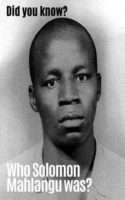“My blood will nourish the tree that will bear the fruits of freedom. Tell my people that I love them. They must continue the fight,” said Solomon Kalushi Mahlangu just before he was sent to the gallows for his execution.
Solomon Mahlangu was a freedom fighter under the apartheid regime and remains one of the most important representations of freedom in our country. To this day, his legacy has a great impact South African youth.
The crime for which he was hanged on April 6 1979 was murder, even though there was no evidence that he had pulled the trigger. His true crime, however, was standing up against a brutal, tyrannical regime and fighting for the equality of all people in South Africa. Mahlangu was executed at the age of 22.
Mahlangu was a South African operative for the African National Congress (ANC) military wing, uMkhonto weSizwe (MK). He was raised by a single mother, Martha Mahlangu, who was a domestic worker. He attended Mamelodi High School until his education was interrupted by the 1976 Soweto uprising, which resulted in schools being closed. He was in grade 10 at the time.
After the uprising, he left the country for Mozambique to be trained as a member of MK. He left with without informing his family of where he was going. He left a letter under his brother’s pillow:
“Boet Lucas, Boet Lucas, Boet Lucas, don’t look for me, I have left and you will never find me.”
Later, the father of a young man Mahlangu had left the country with came to inform Mahlangu’s family that he had left to join MK. Mahlangu spent 6 months in Mozambique in a refugee camp. From there he was taken to Angola to an ANC training camp called “Engineering”. There, and at ‘Funda Camp’, he received training in sabotage, military combat, scouting and politics.
He, George ‘Lucky’ Mahlangu, and Mondy Motloung were taken to Swaziland, where they were given large suitcases filled with pamphlets, rifles and hand grenades. On 11 June 1977, they crossed the border into South Africa and started making their way to Johannesburg.
The comrades were then arrested in central Johannesburg. A police officer was suspicious of their suitcases and grabbed one. An AK-47 and a hand grenade fell out. Mahlangu and Motloung fled in the same direction while Lucky fled in his own. Mahlangu and Motloung took refuge in a retailer and one of them opened fire killing two people and injuring two others. The two were eventually arrested.
Today Mahlangu’s life has been commemorated many ways. Solomon Mahlangu Freedom Square was opened in 2015 in his hometown of Mamelodi, with a bronze statue of him being the focus of the area. During the 2015 #FeesMustFall movement the song ‘Solomon’ was sung to show unity among protesters and as a way of paying homage to the country’s strong struggle history. And, in 2016 the main administrative building at the University of the Witwatersrand, a hub for the #FeesMustFall movement, was renamed Solomon Mahlangu House.
Mahlangu’s memory continues to inspire a new generation of leaders to fight for a country that is equal for all South Africans. Mahlangu stood tall in the face of injustice and his heroic life, a life of refusing to stand by and watch injustice prevail, will inspire many South Africans to come. Mahlangu’s life reminds the youth that you can stand up to injustice at whatever age. A luta continua!
Tell us: How are you inspired by the story of Solomon Mahlangu’s life?


